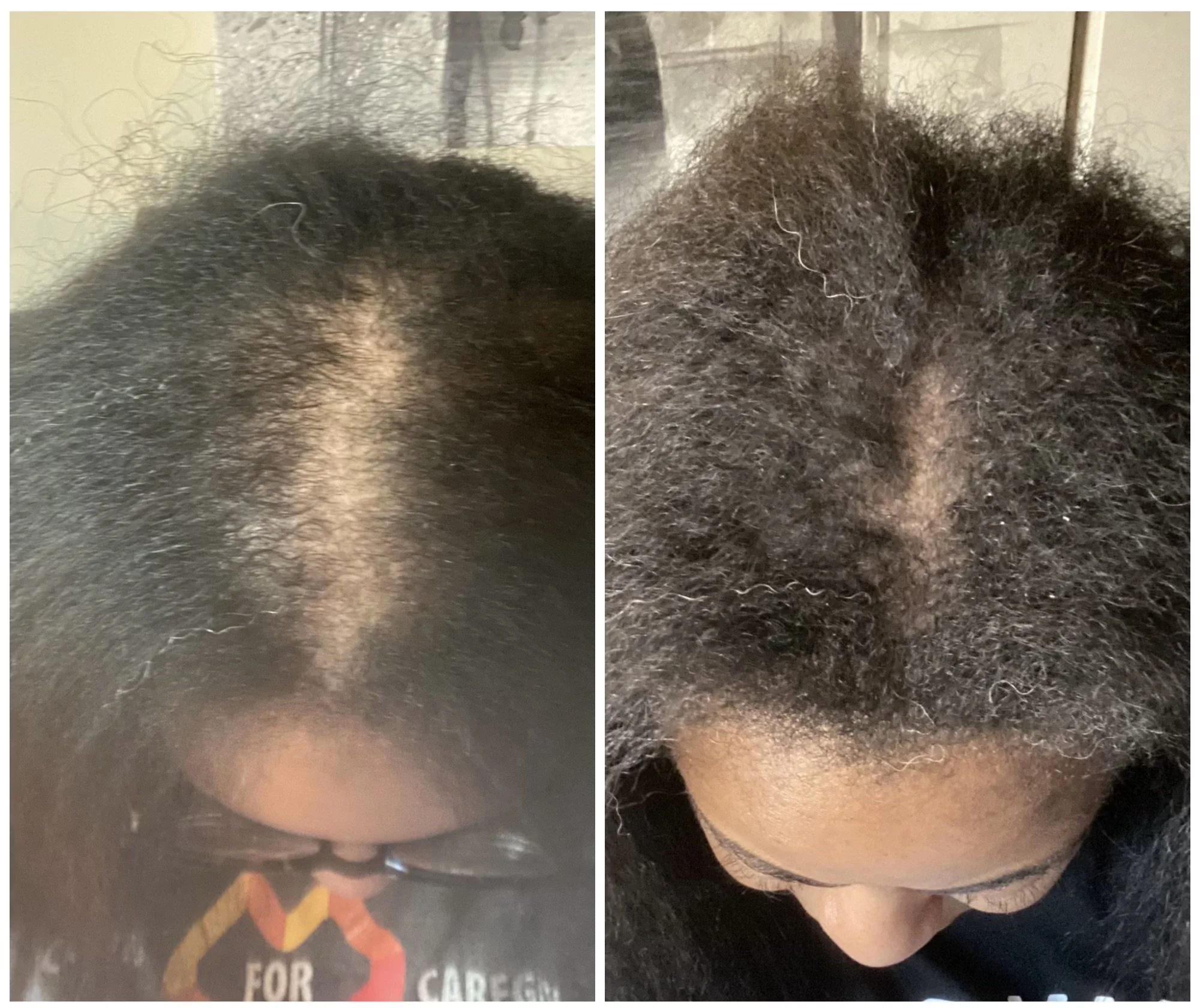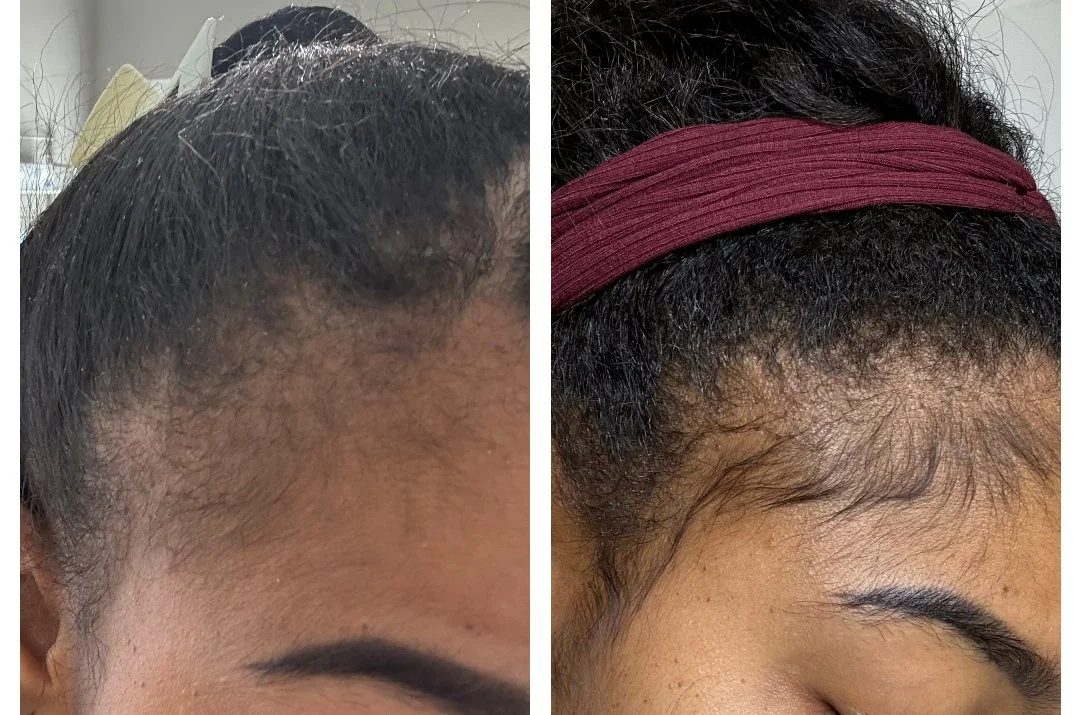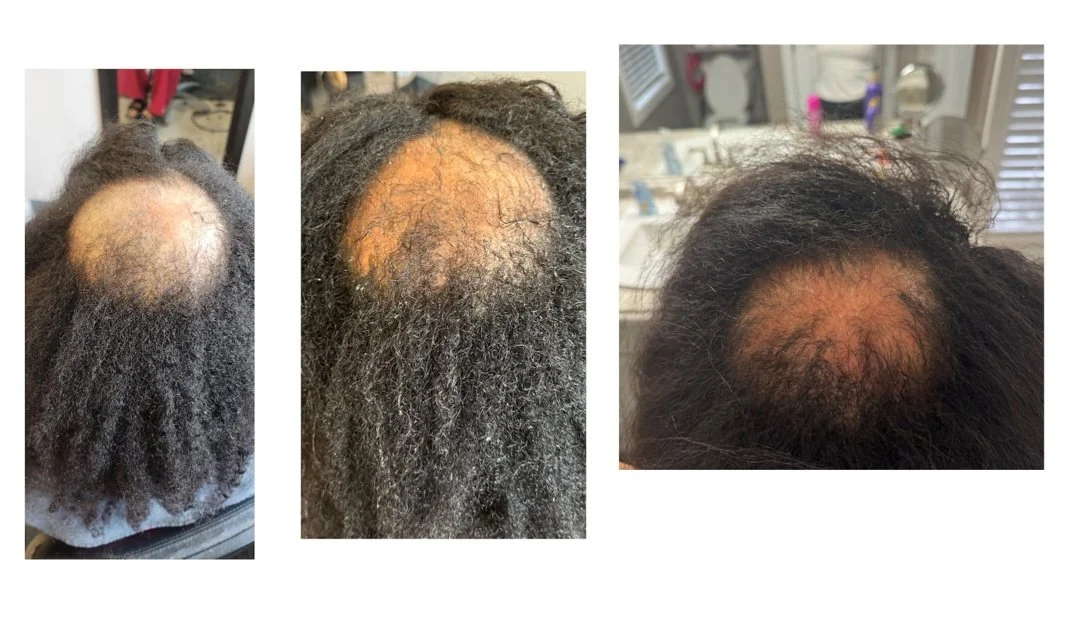
Hair Restoration
Hair Loss & Alopecia is a very special topic for Dr. Davis - as someone who personally suffers from a form of alopecia, she has been an advocate for treatment for years!
Alopecia and hair loss can also be the result of :
genetics
trauma
pregnancy
medications
stress
& many more situations
Say goodbye to hair loss and hello to a fuller, healthier head of hair with our cutting-edge hair restoration services. We offer a comprehensive range of treatments, including topical solutions, oral medications, and the latest in regenerative therapy with exosomes. Our personalized approach targets hair loss at its source, promoting natural growth and long-lasting results. Whether you’re just starting to notice thinning or looking to reverse years of hair loss, our expert team is here to help you achieve the look you deserve. Let’s create your custom hair restoration journey today!
Client Before and After - 7 Months March to October 2024
7 month progression: June 2024 - September 2024 - January 2025
Initial Consultation
$100
($75 - current patients on a membership program )
30 minutes
During your initial consultation, the provider will conduct a medical history & health assessment screening. She will then discuss your current concerns & wellness goals, review available treatment options, and discuss the potential treatment plan.
Your initial consultation can be completed via video conference or in-person.
There are specific conditions that are not treated in the office and are excluded from treatment due to risk. These will be discussed during the visit.
You will be given an order for lab work during your appointment. All patients are required to have initial labs to initiate treatment and lab work may be repeated at various stages during the treatment plan. Labs are patient and treatment-specific and the cost of labs are not included in the consultation cost.
We offer low cost, self pay labs via LabCorp
Labs can also be billed through insurance
This will also be completed at LabCorp or may be completed with your PCP
If you have decided to take the next step into REJUVENATING your life at the end of this visit, you will be scheduled for a treatment initiation appointment.
*Once your labs are complete, we will contact you with a treatment plan.
Treatments
Treatments are very individualized! Our goal is always to return your hair to it’s highest potential.
Please note - in some cases, hair may NOT return; while some patients may experience full regrowth, there are cases in which treatments may only prevent further loss and you must have reasonable expectations when starting treatment.
Treatment options include:
Topicals
Oral Medications
Exosomes
Please remember - hair restoration will take time. It can take months to years to reach to full extent of your treatments.
Pricing will depend on your medication.
FAQs
-
There are several types. Some of the common forms are:
1. Androgenetic Alopecia (Male or Female Pattern Baldness)
Cause: Genetic predisposition and hormonal factors, primarily dihydrotestosterone (DHT).
Symptoms: Gradual thinning of hair, typically along the crown or hairline for men; diffuse thinning for women.
Treatment: Topicals (e.g., minoxidil), oral medications (e.g., finasteride), hair transplants, and other therapies.
2. Alopecia Areata
Cause: Autoimmune disorder where the immune system attacks hair follicles.
Symptoms: Sudden, round patches of hair loss on the scalp or other areas of the body.
Treatment: Corticosteroids, immunotherapy, and sometimes regrowth treatments like topicals or injectables.
3. Telogen Effluvium
Cause: Stress, hormonal changes, illness, or nutritional deficiencies, causing hair follicles to enter a resting phase prematurely.
Symptoms: Diffuse thinning or shedding throughout the scalp.
Treatment: Addressing the underlying cause (e.g., stress management, nutrition) and stimulating regrowth.
4. Traction Alopecia
Cause: Prolonged tension or pulling on hair from tight hairstyles or extensions.
Symptoms: Hair loss along the hairline or areas under constant strain.
Treatment: Avoiding tension-causing hairstyles, scalp care, and regrowth therapies.
5. Cicatricial (Scarring) Alopecia
Cause: Inflammatory conditions or injuries that damage hair follicles permanently.
Symptoms: Patchy hair loss accompanied by scarring and possibly itching or pain.
Treatment: Early intervention with anti-inflammatory medications to prevent further damage.
6. Anagen Effluvium
Cause: Rapid hair loss due to medical treatments, such as chemotherapy.
Symptoms: Sudden loss of most or all hair on the scalp and possibly body hair.
Treatment: Hair often regrows post-treatment, but cooling caps and specialized care may help minimize loss.
7. Diffuse Alopecia
Cause: Systemic conditions (e.g., thyroid disorders, chronic illness) or generalized factors.
Symptoms: Overall thinning without distinct patterns or patches.
Treatment: Treating the root cause and supporting hair health.
8. Traumatic Alopecia
Cause: Physical or chemical trauma, such as burns or harsh hair treatments.
Symptoms: Localized loss of hair in affected areas.
Treatment: Protecting the scalp, managing scars, and possible restoration techniques.
-
Some topical treatments include:
Minoxidil - Widens blood vessels and increases blood flow to hair follicles, prolonging their growth phase.
Finasteride - Blocks dihydrotestosterone (DHT), a hormone responsible for shrinking hair follicles in androgenetic alopecia.
-
Finasteride and Minoxidil can also be used in oral form. Spironolactone has also been used.
-
Steroids are sometimes used to treat hair loss, but their application can vary depending on the underlying cause. While steroids have their use, long-term or excessive use of steroids, may exacerbate hair loss in the long run.
-
Exosomes are increasingly being explored as a treatment for hair loss, particularly androgenetic alopecia (male or female pattern baldness). They are tiny extracellular vesicles released by cells, rich in growth factors, proteins, and RNA. Derived from mesenchymal stem cells or other sources, exosomes are thought to promote hair regrowth by stimulating hair follicle cells, reducing inflammation, and enhancing blood supply to the scalp. Here's an overview:
How Exosomes Work for Hair Loss
Stimulate Hair Follicles: Exosomes contain growth factors like VEGF and FGF, which encourage hair follicle activity and prolong the growth phase of the hair cycle.
Reduce Inflammation: Inflammatory conditions can contribute to hair loss. Exosomes carry anti-inflammatory agents to the scalp.
Promote Angiogenesis: They enhance blood flow by encouraging new blood vessel formation, delivering nutrients to hair follicles.
Cell Regeneration: Exosomes support cellular repair and regeneration in the scalp's microenvironment.





